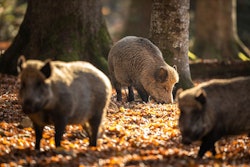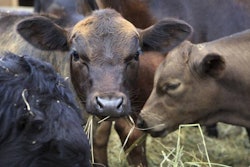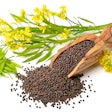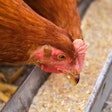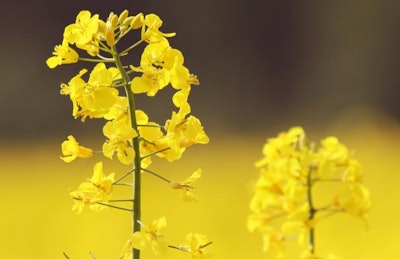
A new research project in Germany supported by federal government funding is looking at feeding a novel rapeseed product to poultry.
Germany’s Federal Ministry of Food and Agriculture BMEL has announced financial support for research into the suitability of a rapeseed concentrate as an ingredient for animal feeds.
The move is part of the government’s policy to improve the sustainability of farm animal nutrition, particularly as it is affected by climate change. According to BMEL, its funding will also contribute to maintaining the competitiveness of the national feed industry.
With the latest funding of EUR1.4 million (US$1.53 million), the BMEL is supporting the “Napf” research project. It will focus on the suitability of a new rapeseed concentrate for poultry.
Interest in novel feed proteins has been growing, particularly with the view to replacing all or part of the soybean in diets for farm animals and aquaculture. If successful, the new rapeseed material will reduce reliance on imported soy, which often contributes significantly to the carbon footprint of the feed and animal products.
Partners in the project are Fraunhofer Center for Chemical Biological Processes (CBP) and the University of Hohenheim, and commercial firms B+B Engineering GmbH, Cargill GmbH, and Raiffeisen Kraftfutterwerk Kehl GmbH.
Novel rapeseed process
Produced using the EthaNa process, the new rapeseed concentrate contains more protein and lower levels of anti-nutritive factors than conventionally processed rapeseed ingredients.
As well as investigating the use of the concentrate for poultry, the project partners will be looking to optimize the production process. Furthermore, they will explore the potential for fully utilizing other products of the EthaNa process.
Between 2017 and February 2022, Fraunhofer CBP conducted a pilot project on ethanolic native extraction of dehulled rapeseed. This was achieved using gentler processing than conventional methods. The latter generally use high temperatures and pressures. These can damage the proteins, as well as producing chemicals harmful to the environment.
Funded by BMEL, the EthaNa project involved 11 scientific and commercial partners, led by Fraunhofer CBP.
While established processes utilize hexane for the extraction, the EthaNa process uses ethanol for this step and the displacement of oil. Maximum temperature reached is 70 C. These conditions were found to improve the quality of the rapeseed oil and concentrate. Additionally, it allowed for the isolation of secondary plant constituents, such as rapeseed hulls, sinapinic acid, tocopherols, and glucosinolates. While sinapinic acid can be used in cosmetic and pharmaceuticals, the hulls can be made into insulation materials.
Further exploration of process potential
Rich in high-quality and un-degraded protein, the rapeseed concentrate has potential in human food as well as for animal feeds.
The completed project resulted in the construction of a pilot plant at Fraunhofer CBP in Leuna in the east German state of Saxony-Anhalt. The potential of the EthNa process is under investigation for other raw materials such as sunflower seeds, and other co-products and waste products.
Lower soybean meal imports forecast in EU
In 2022-23, total oilseed production in the European Union (EU) was up 4% year-on-year at 31.4 million metric tons (mmt). This is according to the latest Short Term Outlook for EU Agricultural Markets in 2023 from the European Commission DG Agriculture and Rural Development.
While sunflower and soybean harvests were down as the result of drought, the rapeseed harvest increased by almost 15% year-on-year to 19.6 mmt.
For the same period, production of oilseed meals in the EU is also expected to reach a record level — of 30.5 mmt. As a result, oilseed meal imports are forecast to decline by 4.6% to 18.7 mmt. This is attributed mainly to a 4% cut in soybean meal imports to 16 mmt for 2022-23.
In a recent Feed Strategy blog, Ioannis Mavromichalis urged caution when considering the substitution of one feed ingredient for another in poultry diets. All nutrients and anti-nutritive factors must be taken into consideration in the formulation, and the diet is correctly balanced. If not, there may be adverse effects on bird health and/or performance.



